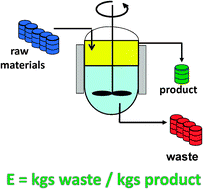
Sheldon points out that a lot of the reactions responsible for the success of the pharmaceutical industry were developed at a time when the toxic properties of many reagents and solvents were not known and waste minimisation and sustainability were not significant issues.
Nowadays, scientists are much more aware of the need to assess and reduce the environmental impact of their organic syntheses, particularly those performed on an industrial scale.
Sheldon’s review discusses the general principles of waste minimisation in organic synthesis, illustrating them with simple practical examples. It is a must-read for all organic chemists because, as Sheldon points out ‘sustainability is our ultimate common goal and green chemistry is a means to achieving it’.
As a bonus, Sheldon has included presentation slides on efficiency in reaction design as electronic supplementary information.










